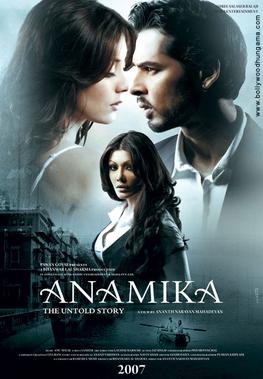
Anamika is an Indian Hindi-language psychological thriller film starring Dino Morea, Minissha Lamba, Gulshan Grover and Koena Mitra. It is written and directed by Anant Mahadevan and produced by Bhanwar Lal Sharma. The film is based on Daphne du Maurier's 1938 novel, Rebecca.
Abha Dawesar is an Indian-born novelist writing in English. Her novels include Babyji, Family Values, That Summer in Paris, and Miniplanner. Her 2005 novel Babyji won the Lambda Literary Award for Lesbian Fiction and the Stonewall Book Award.

Jhalkaribai was a woman soldier who played an important role in the Indian Rebellion of 1857. She served in the women's army of Rani Lakshmibai of Jhansi. She eventually rose to a position of a prominent advisor to the queen, Rani of Jhansi. At the height of the Siege of Jhansi, she disguised herself as the queen and fought on her behalf, on the front, allowing the queen to escape safely out of the fort.
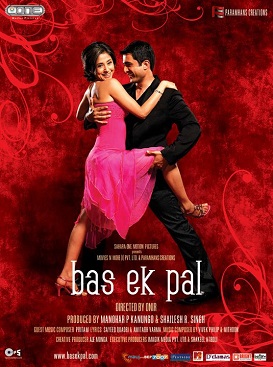
Bas Ek Pal is a 2006 Indian Hindi-language romantic crime thriller film directed by Onir. It stars Juhi Chawla, Sanjay Suri, and Urmila Matondkar with Jimmy Sheirgill, Rehaan Engineer, and Yashpal Sharma in supporting roles. The film's storyline is an adaptation of Live Flesh, a film by Pedro Almodóvar.

Starry Nights is Shobha De's second novel. It is said that the novels' characters, Aasha Rani and her lover Akshay, were based on the real life love-affairs of Amitabh Bachchan with Rekha Ganesan and Dharmendra Singh Deol with Hema Malini. It was a best seller in India and cemented its authors reputation as being a provocative and daring author.

Rich Like Us is a historical and political fiction novel by Nayantara Sahgal. Set in New Delhi during the chaotic time between 1932 and the mid-1970s, it follows the lives of two female protagonists, Rose and Sonali, and their fight to live in a time of political upheaval and social re-organization.
Hasratein (transl. Desires) is an Indian television soap opera that was telecast on Zee TV in the mid 1990s. It is based on the Marathi novel "Adhantari" by Late Shri Jaywant Dalvi.

Noorpur Ki Rani is a Pakistani television series which was broadcast on Hum TV from 25 April 2009 to on 3 October 2009. Written by Pakistani author and screenwriter Samira Fazal, and directed by Haissam Hussain, Noorpur Ki Rani was based on the English novel Rebecca by Daphne Du Maurier. The series stars Sanam Baloch, Nauman Ijaz and Mahnoor Baloch. The plot revolves around an orphan girl, and her journey to become the princess of Noorpur for which she dreamed so long.
Hitler Didi is an Indian soap opera that aired on Zee TV. It premiered on 7 November 2011. The story is located in the backdrop of Delhi.
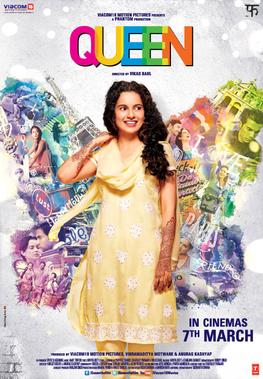
Queen is an iconic female centric 2014 Indian Hindi-language comedy-drama film directed by Vikas Bahl and produced by Anurag Kashyap, Vikramaditya Motwane, and Madhu Mantena. The film stars Kangana Ranaut in the lead role, with Lisa Haydon and Rajkummar Rao playing supporting roles. The film follows the story of Rani Mehra, a diffident Punjabi girl from New Delhi who embarks on her honeymoon to Paris and Amsterdam by herself after her fiancé calls off their wedding.
Rani Sati, also identified as Narayani Devi and referred to as Dadiji (grandmother), is said to be a Rajasthani woman who lived sometime between the 13th and the 17th century and committed sati (self-immolation) on her husband's death. Various temples in Rajasthan and elsewhere are devoted to her worship and to commemorate her act.

Fandry is a 2013 Indian Marathi-language film, written and directed by Nagraj Manjule in his directorial debut. It stars Somnath Awghade, Suraj Pawar, and Rajeshwari Kharat. The story focuses on a young boy's love amidst caste-based discrimination. The film, set in Akolner, a village near Ahmednagar, revolves around the issue of discrimination in India's caste system and narrates the story of a teenager from a Dalit family who lives at the village fringe, and falls in love with an upper-caste girl.

Tunisha Sharma was an Indian television and film actress. She made her acting debut with Bharat Ka Veer Putra – Maharana Pratap as Chand Kawar in 2015. Sharma is best known for having played Rajkumari Ahankara in Chakravartin Ashoka Samrat, Zara/Babli in Ishq Subhan Allah and Aadhya Verma in Internet Wala Love.
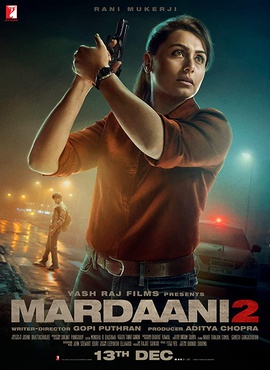
Mardaani 2 is a 2019 Indian Hindi-language action thriller film written and directed by Gopi Puthran. It is produced by Aditya Chopra under Yash Raj Films. A sequel to the 2014 film Mardaani, the film stars Rani Mukerji in the lead role alongside Vishal Jethwa, and Jisshu Sengupta. The plot follows a police officer, Shivani Shivaji Roy's attempts to catch a 21 year old rapist and murderer.

Alo Chhaya was an Indian Bengali television soap opera which premiered on 2 September 2019 as a replacement of the popular daily soap Joyee and aired on Bengali General Entertainment Channel Zee Bangla and all old episodes are also available on the digital platform ZEE5. The series was produced by Susanta Das under the banner of Tent Cinema. It starred Debadrita Basu, Oindrila Bose, and Arnab Banerjee in lead role. The show went off air on 9 April 2021 due to low TRP ratings.

Anushka Sen is an Indian television actress and model. She is well-known for her work in Baalveer, Jhansi Ki Rani, Fear Factor: Khatron Ke Khiladi 11, and Dil Dosti Dilemma.

Apna Time Bhi Aayega is an Indian Hindi-language television drama that aired on Zee TV. The show stars Fahmaan Khan, Megha Ray and Vivana Singh in the lead roles.

Khuda Haafiz: Chapter 2 – Agni Pariksha, also known as Khuda Haafiz 2, is a 2022 Indian Hindi-language action thriller film directed by Faruk Kabir and produced under Panorama Studios, Action Hero Films and Cinergy. A sequel to the 2020 film Khuda Haafiz, Vidyut Jammwal and Shivaleeka Oberoi reprise their roles from the original film, while Rukhsar Rehman, Dibyendu Bhattacharya, Sheeba Chaddha, Riddhi Sharma, Bodhisattva Sharma, Anushka Marchande, Deepak Tokas and Mohammed Saud Mansuri appear in pivotal supporting roles.
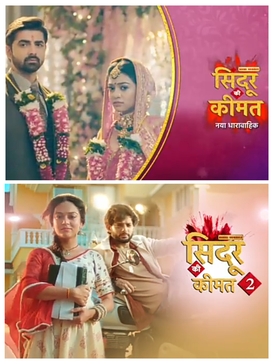
Sindoor Ki Keemat is an Indian Hindi drama romantic television series produced by 4 Lions Films, starring Vaibhavi Hankare and Shehzad Sheikh. The show premiered on 14 October 2021, and it aired on Dangal. It is the remake of the Sun TV's Tamil TV series Roja. The second season, Sindoor Ki Keemat 2, was first broadcast on 1 May 2023, and it stars Vaibhavi Hankare and Mohit Hiranandani. The storyline of the show is loosely based on the Tamil TV series Kannedhirey Thondrinal.

Mithya is an Indian Hindi-language, psychological thriller drama web series streaming on ZEE5. It is directed by Rohan Sippy and produced by Applause Entertainment and Vipin Agnihotri Films. The series was released on 18 February 2022 and stars Huma Qureshi, Avantika Dassani, Parambrata Chatterjee, Rajit Kapur and Samir Soni in pivotal roles. The series is adapted from the British television show Cheat! Avantika Dassani made her acting debut with this series. The drama was exclusively shot in St. Paul's School, Darjeeling. Following the conclusion of the first season, a second season, titled Mithya: The Darker Chapter, was announced in October 2024 and premiered on 1 November 2024. Actor Naveen Kasturia joined the cast in a pivotal role.
















